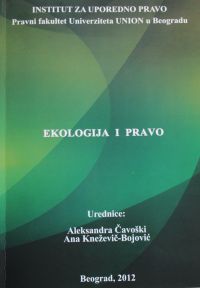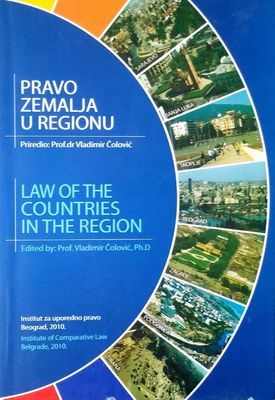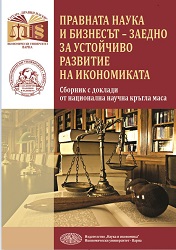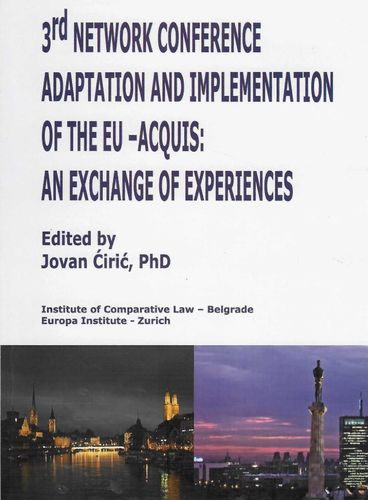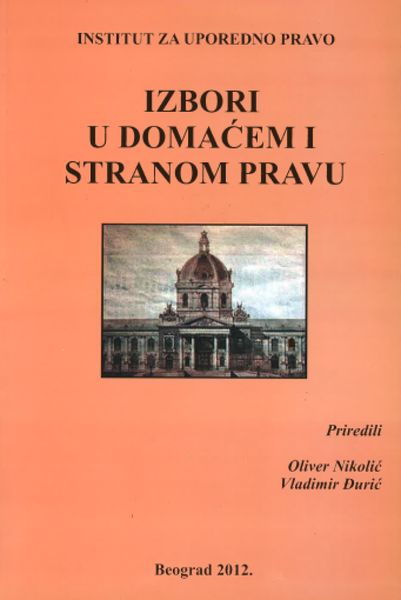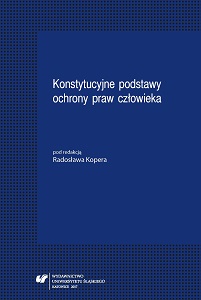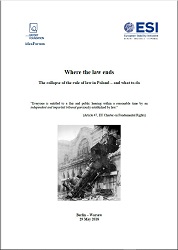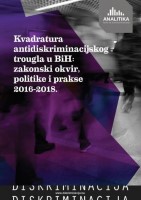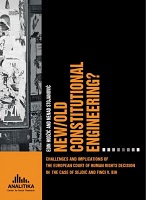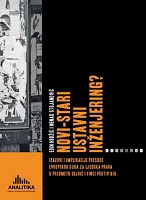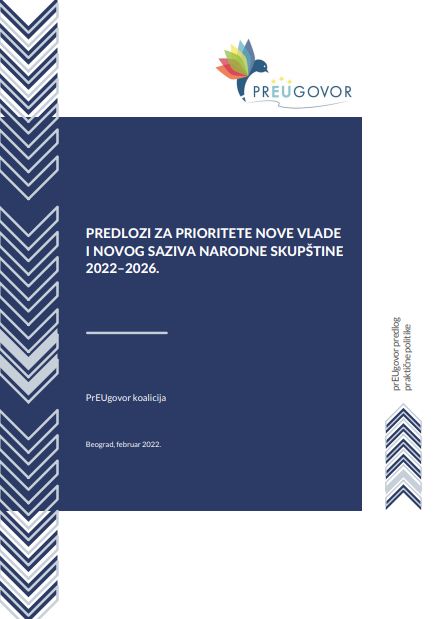Author(s): Nenad Stojanović,Edin Hodžić / Language(s): English
The judgment of the European Court of Human Rights on the application by Dervo Sejdić and Jakob Finci, issued on 22 December 2009, has been attracting wide media coverage and provoking academic and expert debates in Bosnia and Herzegovina. Yet the complexity of its execution seems not to have been adequately recognised in the rather intense debate that it triggered. This debate has been dominated by simplified interpretations that view the judgment either as a prelude to a gradual abandonment of ethnocracy and to the affirmation of citizens as individuals in the political system, or as an act opening up room for something akin to a pluralisation of ethnocracy simply by introducing the category of ‘Others’ into the tripartite structure of Bosnia and Herzegovina, a state of constituent peoples. However, our research operates on the assumption that the possible approaches to the execution of the judgment, based on international and comparative law, are anything but simple. The main intention of this research project is to offer decision-makers, journalists and public officials, as well as the academic community and the wider public, a systematic overview of the conceptual premises, relevant international standards, comparative experiences (especially those from other divided societies) and the past political practice in Bosnia with regard to the political participation of both the constituent peoples and ‘Others’. This overview is necessary in order to identify potential directions that reform of the Bosnian Constitution and the amendments to relevant laws (above all, the Bosnian Election Law) could take in order to ensure the execution of the Sejdić-Finci judgment in ways that would not upset the system of power-sharing established between the three constituent peoples, while still ensuring the political participation of ‘Others’ on a non-discriminatory basis. Our analysis, conceived and implemented as described, has led us to make a number of recommendations that, with due regard to the particularities of the Bosnian context, suggest mechanisms that could potentially be used to execute the judgment in the case of Sejdić and Finci v. Bosnia and Herzegovina. As regards the actual substance of the constitutional reform that could be undertaken in light of the Sejdić-Finci case, the findings of our research are the following: - Bosnia and Herzegovina is not the only state exhibiting the conflict between specific consociational mechanisms and the imperative of ensuring equality and the full enjoyment of human rights in political and public life. For example, Italy has an almost equally problematic system of political participation in the province of South Tyrol, based on the principle of mandatory political ‘aggregation’ of individuals into dominant groups. - In other countries, the mechanisms for representation of ethno-cultural identities have mostly developed in the context of minorities, that is as an exception from the liberal-civic principle of the neutrality of the state and representation of citizens as individuals. Where elements of ethnic federalism exist, political representation at the state level is for the most part ensured based on the territorial principle (i.e. on the principle of representation through federal units), as is the case in Canada, for instance. Also, in contexts where identity as such plays a significant role in political life (e.g. in Belgium), the politically relevant identity is determined based on membership to linguistic groups. Such groups are, by definition, much more open and inclusive than ethno-cultural groups since they can encompass different identities, including ethno-cultural ones. - In view of the above, comparative experiences in the domain of political participation and identity representation certainly have some pertinence and importance when considering possible models for the execution of the judgment, but constitutional specificities of Bosnia and Herzegovina have to be taken into account. - Almost all of the proposals identified for the execution of the part of the judgment concerning the Bosnian Presidency, including the views of the Venice Commission, are not without flaws: Those who propose indirect election of members of the Presidency by the House of Representatives of the Parliamentary Assembly of Bosnia and Herzegovina disregard the possibility of additional political manipulation and unprincipled bargaining by political elites, as well as the fact that not one representative of the ‘Others’ has to date been elected to this legislative body; proposals aimed at increasing the number of members of the Presidency of Bosnia and Herzegovina to four or five, as a rule, do not offer mechanisms to prevent majorisation and manipulation of identities in this context; those who advocate the creation of two electoral units in the Federation of Bosnia and Herzegovina, as a rule, do not take into consideration the additional polarising effect that this option might have on the country’s political life. - As for the House of Peoples of the Parliamentary Assembly of Bosnia and Herzegovina, proposals have mostly focused on mechanisms to elect delegates from the ranks of ‘Others’ to this legislative body. They have for the most part disregarded the question of the House of Peoples’ existing powers, which are, also according to the Sejdić-Finci judgment, one of the key considerations in establishing the discrimination of ‘Others’. - Most proposals for the execution of the Sejdić-Finci judgment that have come before the public do not adequately address this complex problem. Moreover, the solutions offered have rarely been accompanied by appropriate elaboration or argumentation. In particular, there has been a chronic lack of new, innovative solutions that could meet the two-fold demand of representation for ethno-cultural groups and respect for the principle of non-discrimination. - Political actors in BiH have not devoted the appropriate degree of attention to the execution of the judgment in the case of Sejdić and Finci v. Bosnia and Herzegovina. One proof of this inadequacy is the work of the Working Group set up by the Council of Ministers of BiH with the aim of executing the judgment: since its establishment in March 2010, it has yielded no results whatsoever. In addition, neither do the available platforms of political parties, even when they do address the issue, reflect or recognise its complexity, or offer appropriate elaboration and argumentation of their positions. Our interviews with some of the key actors in this process have for the most part also confirmed our assumption that there has been a lack of understanding of this complex issue and insufficient knowledge of the options available to decision-makers. - The media discourse on the judgment itself and its implications has been very limited and unvaried, almost entirely focusing on possible sanctions and the general consequences for Bosnia and Herzegovina for failure to execute the judgment. There has hardly been any media coverage – at least in print media – focusing on the substance of the judgment or the consistent promotion of equality in the enjoyment of political rights by all citizens of Bosnia. Combining descriptive, analytical, comparative and prescriptive elements, the present study concludes with four specific recommendations: – It is certainly necessary for experts in constitutional and international law, as well as experts in comparative political and electoral systems, to become more actively engaged in the public discourse on the execution of the Sejdić-Finci judgment. With a view to this, and as a modest contribution to the project and to increasing the number of available constitutional options, we have formulated a proposal for a mechanism to elect the Presidency of BiH based on the principle of the so-called geometric mean. This, in our view, adequately balances out the demands of identity politics and the principle of non-discrimination. In addition, the proposal encourages cross-entity and cross-ethnic cooperation, ensuring the introduction of a more moderate discourse in political campaigns and political life in general. – When it comes to the House of Peoples of the Parliamentary Assembly of Bosnia and Herzegovina, one should not look for relevant comparative experiences beyond Bosnia and Herzegovina itself: the House of Peoples of the Parliament of the Federation of Bosnia and Herzegovina and the Council of Peoples of the Republika Srpska are, in principle, models that can also be applied at the level of Bosnia and Herzegovina. The underlying principle is the following: if the Bosnian authorities wish to continue with the practice of exclusivity in determining the structure of this body and keep its current status as a house of the constituent peoples, its powers need to be significantly reduced, that is, reduced to the level of the protection of vital national interests. In other words, in this case the House of Peoples of the Parliamentary Assembly of Bosnia and Herzegovina should be equivalent to the Council of Peoples of the Republika Srpska. Conversely, if its current powers are to be kept, the House of Peoples must also be open to delegates not only from the ranks of minorities, but also to all other persons belonging to the constitutional category of ‘Others’. In other words, in this case the House of Peoples of the Parliamentary Assembly of Bosnia and Herzegovina should replicate the model of the House of Peoples of the Federation of Bosnia and Herzegovina. – Intra-party ethno-cultural pluralism is a necessary condition for ensuring multiethnic governance at all levels. This problem is best illustrated by the utterly disregarded fact that, as we have noted, neither the House of Peoples nor the House of Representatives of the Parliamentary Assembly of Bosnia and Herzegovina has ever had a member drawn from the ranks of ‘Others’ although the Constitution and the Election Law of Bosnia and Herzegovina do not contain any formal obstacles to such a genuinely pluralistic composition of the House of Representatives. It is, therefore, necessary to carefully consider the legal and institutional mechanisms for ensuring intra-party pluralism in this domain. – In view of all the problems, inconsistencies, inequalities and paradoxes inherent in the principle and practice of representing the constituent peoples and ‘Others’ as separate identities, which are unequivocally demonstrated in this report, Bosnia and Herzegovina needs, at least in the long term, to move from an ethnic federation to a territorial one that would introduce the principle of representation based on territory rather than based on ethno-cultural identities. However, reforms that would take the country in that direction are currently hampered by the prevailing approach and practice, whereby a territory is conceived of as a space of ethno-cultural domination and discrimination of all minority identities rather than that of openness, inclusiveness and equality, as is the case with most territorial federations, especially in Europe.
More...


